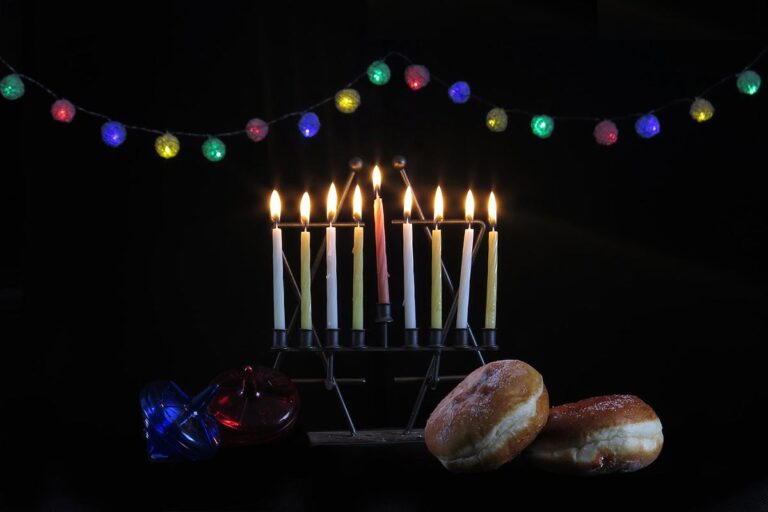
Hanukkah — or Chanukah, both are common spellings — is taking place between Dec. 7 and Dec. 15.
The Jewish Festival of Lights is an eight-day holiday commemorating the ancient Jews’ triumph over their Greek-Syrian oppressors. It is a holiday about miracles and perseverance and is one of the most celebrated Jewish holidays.
Here’s how to wish your friends and loved ones a happy Hanukkah.
How to wish someone a happy Hanukkah
In most instances, just saying “Happy Hanukkah” is sufficient. However, if you’re looking to say have a good holiday in Hebrew there are a few options.
- Chanukah sameach! (Happy Hanukkah)
- Chag sameach! (Happy holiday)
- Chag urim sameach! (Happy festival of lights)
What is the history of Hanukkah?
Hanukkah celebrates the rededication of the Second Temple of Jerusalem after it was defiled by the Seleucid Empire in 164 B.C.E.
Judea — an area that is now part of Israel and the West Bank — was taken over by Greek King Antiochus III, who allowed the Jews to practice their religion. When he died, his son Antiochus IV Epiphanes took power.
The new king forced the Jews to assimilate into Hellenist Greek culture and outlawed Judaism, making practicing it a capital offense.
In 168 B.C.E., Antiochus IV’s soldiers stormed Jerusalem, slaughtered thousands and ransacked the Jewish Temple, building an altar to Zeus and sacrificing pigs within the holy site.
Mattathias, along with his five sons, led the Jews in a rebellion against the Greeks. One year into the revolt, Mattathias is killed in battle, and his son Judah took over as leader of the Maccabees. Within two years, the Maccabees captured Jerusalem and defeated the Greeks.
The Maccabees resolved to rededicate the Temple and restore it to its former glory. They cleaned it, rebuilt the ark, and lit the menorah. The menorah needed to be lit at all times, but the Maccabees realized they only had oil for one night.
However, a miracle prevailed and the oil lasted for eight nights. To honor this miracle, we celebrate for eight days and light eight candles.
In the Jewish calendar, which is a lunar calendar, Hanukkah begins on the 25th of Kislev and lasts for eight days. This corresponds to sometime between late November and late December in the Gregorian calendar.
How do Jews celebrate Hanukkah?
The central and most iconic Hanukkah tradition is lighting the menorah.
Each night, one candle is added to the menorah and lit with the ninth candle called the shamash, or “helper” candle. For a refresher on how to light the menorah, read our Hanukkah guide.
In honor of the miracle of the oil that lasted eight days, it is customary to eat fried foods, most notably latkes (potato pancakes) and sufganiyot (jelly doughnuts).
Many families celebrate Hanukkah, which means “dedication” in Hebrew, by giving gifts one each night. If you’re looking for a gift for a loved one, check out Unpacked’s Hanukkah gift guide.
Because it was illegal for Jews to practice their faith during the Seleucid Empire, many would hide in the hills to worship. When the Greeks would come, they would say that they were gambling. That gambling tradition is recalled through playing dreidel, a spinning top game to win Hanukkah gelt — chocolate coins wrapped in gold or silver foil.
Players spin the dreidel and land on nun, gimmel, hey or shin, the Hebrew letters that appear on the sides of the dreidel in the Diaspora. The letters stand for nes gadol haya sham, meaning, “a great miracle happened there.”
In Israel, the dreidel bears the letters nun, gimmel, hey, and pey, for nes gadol haya po which means “a great miracle happened here.”
Originally Published Dec 7, 2023 10:34AM EST
